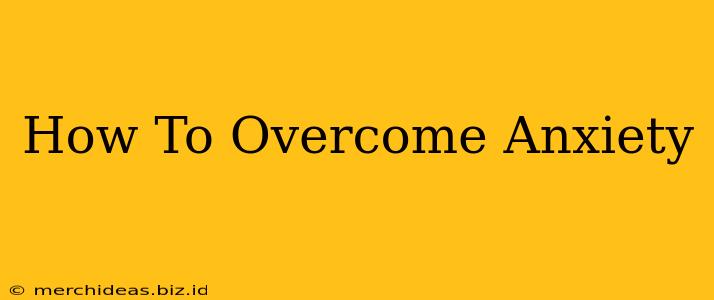Anxiety. That nagging feeling of worry, unease, or fear that can creep into our lives and disrupt our peace. It's a common experience, but it doesn't have to control you. This comprehensive guide offers practical strategies to help you manage and overcome anxiety, paving the way for a calmer, more fulfilling life.
Understanding Your Anxiety
Before diving into solutions, it's crucial to understand the nature of your anxiety. Is it generalized anxiety disorder (GAD), social anxiety, panic disorder, or something else? Identifying the type of anxiety you're facing can help you tailor your approach to treatment. Consider keeping a journal to track triggers, symptoms, and their intensity. This can be invaluable information for you and your healthcare provider.
Common Anxiety Symptoms:
- Physical: Racing heart, shortness of breath, sweating, trembling, muscle tension, headaches, stomach problems.
- Emotional: Irritability, restlessness, feeling overwhelmed, difficulty concentrating, feeling on edge.
- Behavioral: Avoidance of situations that trigger anxiety, excessive worrying, difficulty sleeping.
Practical Strategies to Overcome Anxiety
While professional help is often essential for managing severe anxiety, many techniques can be used to alleviate symptoms and improve your overall well-being.
1. Lifestyle Changes: The Foundation of Anxiety Management
Healthy Diet: Nourishing your body with a balanced diet rich in fruits, vegetables, and whole grains can significantly impact your mood and anxiety levels. Limit processed foods, sugar, and caffeine, which can exacerbate symptoms.
Regular Exercise: Physical activity is a natural mood booster. Aim for at least 30 minutes of moderate-intensity exercise most days of the week. Even a short walk can make a difference.
Sufficient Sleep: Sleep deprivation can worsen anxiety. Prioritize 7-9 hours of quality sleep each night. Establish a relaxing bedtime routine and create a conducive sleep environment.
Mindfulness and Meditation: These practices can help you become more aware of your thoughts and feelings without judgment, reducing the power of anxious thoughts. Numerous apps offer guided meditations for beginners.
2. Cognitive Behavioral Therapy (CBT) Techniques
CBT is a highly effective therapy for anxiety. It helps you identify and challenge negative thought patterns and behaviors that contribute to anxiety. Key CBT techniques include:
- Identifying and Challenging Negative Thoughts: Learn to recognize and question your anxious thoughts. Are they realistic? What evidence supports or refutes them?
- Cognitive Restructuring: Replace negative thoughts with more balanced and realistic ones.
- Exposure Therapy: Gradually expose yourself to situations that trigger your anxiety in a safe and controlled manner. This helps you reduce your fear response over time.
3. Relaxation Techniques for Immediate Relief
When anxiety strikes, these techniques can offer immediate relief:
- Deep Breathing Exercises: Slow, deep breaths can help calm your nervous system. Try the 4-7-8 breathing technique: Inhale for 4 seconds, hold for 7 seconds, and exhale for 8 seconds.
- Progressive Muscle Relaxation: Systematically tense and release different muscle groups to reduce physical tension.
- Guided Imagery: Visualize a peaceful and calming scene to distract yourself from anxious thoughts.
4. Seeking Professional Help
If your anxiety is significantly impacting your daily life, don't hesitate to seek professional help. A therapist or psychiatrist can provide a proper diagnosis, personalized treatment plan, and ongoing support. They may recommend therapy, medication, or a combination of both.
Building a Supportive Network
Surrounding yourself with a strong support network is crucial. Talk to trusted friends, family members, or a support group about your anxiety. Sharing your experiences can be incredibly helpful and reduce feelings of isolation.
Conclusion: Your Journey to a Calmer Life
Overcoming anxiety is a journey, not a destination. Be patient with yourself, celebrate your progress, and remember that you're not alone. By incorporating these strategies into your life, you can take control of your anxiety and create a calmer, more fulfilling future. Remember, seeking professional help is a sign of strength, not weakness. Take the first step towards a healthier, happier you today.
